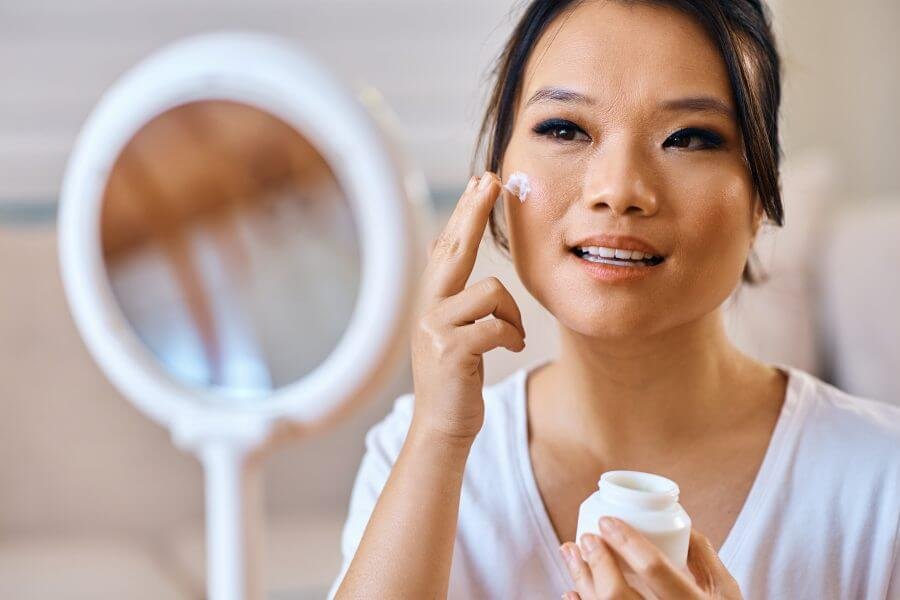The quest for youthful skin has captivated women across cultures and generations. While aging is a natural process we all experience, understanding how to care for your skin can help you maintain a healthy, radiant complexion for years to come.
Anti-aging skincare isn’t about chasing impossible standards or turning back time completely. Instead, it’s about making informed choices that support your skin’s health and natural beauty. The good news? You don’t need an expensive arsenal of products or complicated routines to see real results.
This comprehensive guide will walk you through the science-backed strategies that actually work, from understanding what causes skin to age to building an effective routine that fits your lifestyle. Whether you’re in your twenties looking to prevent future damage or in your fifties seeking to address existing concerns, these insights will help you make confident decisions about your skincare journey.
Understanding Skin Aging
Skin aging happens through two primary pathways, and knowing the difference can transform how you approach skincare.
Intrinsic aging is the natural process your skin undergoes as you get older. Starting around age 25, your skin produces about 1% less collagen each year. This leads to thinner skin, reduced elasticity, and the gradual appearance of fine lines. Your skin’s natural oil production also decreases, which can result in dryness and a less plump appearance.
Extrinsic aging, on the other hand, comes from external factors you can actually control. Sun exposure accounts for up to 80% of visible facial aging signs, making it the single most significant factor in premature skin aging. Environmental pollutants, smoking, poor nutrition, and chronic stress also accelerate the aging process by generating free radicals that damage skin cells.
Understanding this distinction is empowering because while you can’t stop intrinsic aging, you have considerable control over extrinsic factors. This means many of the changes you attribute to “getting older” are actually preventable and, in some cases, reversible.
Key Ingredients to Look For
Not all skincare ingredients are created equal when it comes to anti-aging benefits. Here are the scientifically proven powerhouses you should prioritize:
Retinoids are considered the gold standard in anti-aging skincare. These vitamin A derivatives boost collagen production, accelerate cell turnover, and improve skin texture. Start with over-the-counter retinol if you’re new to these ingredients, or consider prescription tretinoin for more dramatic results.
Antioxidants like vitamin C, vitamin E, and niacinamide protect your skin from free radical damage while brightening your complexion. Vitamin C serums work particularly well when applied in the morning under sunscreen, providing an extra layer of protection against environmental stressors.
Peptides are short chains of amino acids that signal your skin to produce more collagen. While they work more gently than retinoids, they can be an excellent option for sensitive skin types who want to boost firmness and elasticity.
Hyaluronic acid is a moisture magnet that can hold up to 1,000 times its weight in water. This ingredient plumps the skin from within, temporarily reducing the appearance of fine lines while providing essential hydration.
Building a Skincare Routine
An effective anti-aging routine doesn’t need to be complicated, but it should be consistent. Here’s a step-by-step approach that works:
Morning routine should focus on protection. Start with a gentle cleanser, follow with a vitamin C serum, apply a moisturizer appropriate for your skin type, and finish with broad-spectrum SPF 30 or higher. This combination protects against daily environmental damage while maintaining hydration.
Evening routine is when your skin repairs itself, making it the ideal time for active ingredients. Cleanse thoroughly to remove makeup and sunscreen, apply your treatment products (like retinol or peptides), and seal everything in with a nourishing night moisturizer.
Weekly additions can include gentle exfoliation 1-2 times per week using either chemical exfoliants (like glycolic or lactic acid) or a mild physical scrub. This removes dead skin cells and allows your other products to penetrate more effectively.
Remember to introduce new active ingredients gradually. Start with lower concentrations and use them every other night initially, building up tolerance over several weeks.
Lifestyle Factors
Your skincare routine is just one piece of the anti-aging puzzle. Several lifestyle factors significantly impact how your skin ages:
Nutrition plays a crucial role in skin health. Foods rich in antioxidants, omega-3 fatty acids, and vitamins A, C, and E support collagen production and protect against oxidative stress. Stay hydrated by drinking plenty of water throughout the day.
Sleep is when your skin undergoes its most important repair processes. During deep sleep, growth hormone production peaks, promoting cellular regeneration. Aim for 7-9 hours of quality sleep nightly, and consider using a silk pillowcase to reduce friction on delicate facial skin.
Stress management is often overlooked but essential. Chronic stress increases cortisol levels, which breaks down collagen and impairs skin barrier function. Regular exercise, meditation, or other stress-reduction techniques can have visible benefits for your complexion.
Debunking Common Myths
The skincare industry is full of misconceptions that can lead to wasted money and disappointment. Let’s address some persistent myths:
Myth: Expensive products are always better. Price doesn’t determine effectiveness. Many affordable drugstore products contain the same active ingredients as luxury brands. Focus on ingredient lists rather than price tags.
Myth: You should change your routine frequently. Skincare products need time to show results, typically 6-12 weeks for most anti-aging ingredients. Constantly switching products prevents you from seeing their true potential.
Myth: Oily skin doesn’t need moisturizer. All skin types benefit from appropriate hydration. Skipping moisturizer can actually trigger increased oil production as your skin tries to compensate for dryness.
Professional Treatments
While a good at-home routine forms the foundation of anti-aging care, professional treatments can provide additional benefits:
Chemical peels remove damaged surface layers, revealing smoother, more even-toned skin underneath. Light peels require minimal downtime, while deeper peels offer more dramatic results.
Microdermabrasion uses gentle abrasion to improve skin texture and stimulate collagen production. It’s particularly effective for addressing sun damage and fine lines.
Laser treatments can target specific concerns like age spots, broken capillaries, or deeper wrinkles. These treatments typically require multiple sessions but can provide long-lasting improvements.
Always consult with a board-certified dermatologist or licensed aesthetician to determine which treatments might be appropriate for your skin type and concerns.
Frequently Asked Questions
When should I start using anti-aging products?
Prevention is easier than correction, so many dermatologists recommend starting a basic anti-aging routine in your mid-twenties. However, it’s never too late to begin caring for your skin properly.
Can I use retinol and vitamin C together?
While some people can use both ingredients in the same routine, it’s often better to use vitamin C in the morning and retinol at night to minimize potential irritation and maximize effectiveness.
How long does it take to see results from anti-aging skincare?
Most people notice initial improvements in skin texture and hydration within 4-6 weeks. More significant changes like reduced fine lines and improved firmness typically become visible after 3-6 months of consistent use.
Is it normal for my skin to get worse before it gets better?
Some ingredients, particularly retinoids, can cause initial dryness, peeling, or breakouts as your skin adjusts. This “purging” period typically lasts 4-6 weeks and is often a sign that the product is working.
Do I need different products for day and night?
While not strictly necessary, using different products can optimize your routine. Daytime products should focus on protection (antioxidants and SPF), while nighttime products can contain more intensive repair ingredients.
Your Journey to Healthier Skin Starts Now
Effective anti-aging skincare combines scientific knowledge with consistent daily habits. The key is understanding your skin’s needs, choosing proven ingredients, and maintaining realistic expectations about timelines and results.
Remember that healthy, well-cared-for skin at any age is more beautiful than skin that’s been damaged by neglect or harsh treatments. Start with the basics—gentle cleansing, daily sun protection, and appropriate moisturization—then gradually introduce targeted treatments based on your specific concerns.
Your skin is unique, and what works for others may need adjustment for you. Be patient with the process, stay consistent with your routine, and don’t hesitate to consult with skincare professionals when you need guidance. The investment you make in your skin today will pay dividends for years to come.




